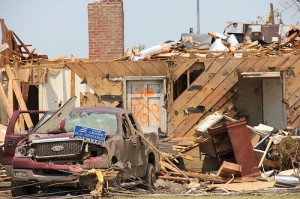Latinos Are Leaving Alabama; Who Will Rebuild After Tornados?
 Alabama lawmakers should have thought this thing through.
Alabama lawmakers should have thought this thing through.
When Governor Robert Bentley signed that state’s new immigration law he boasted, according to a Bloomberg Buisinessweek report, that it was
“the strongest immigration bill in the country.”
He may be right, and his Republican party base may be impressed. The law
- criminalizes assistance (housing, hiring, transportation) to undocumented immigrants
- requires employers to use E-verify system
- requires police and school officials to check residency status
The effect, as you’d expect, is that Latinos are packing-up their things and leaving for less hostile states. Arizona and Georgia are out of the question; those states already have strong immigration laws in place – there are another 22 states in the union where immigration laws failed.
But there’s an unexpected consequence.
The Latinos that are leaving Alabama are taking their tool belts with them at a time when they’re needed the most. More than 5,300 homes were destroyed this past spring in Tuscaloosa when a devastating tornado hit the state. Most of the area contractors hire Latinos to do the rebuilding work. Bloomberg frames the basic issue:
Rebuilding, Bob McNelly, a contractor with Nash-McCraw Properties says, will be slower and more expensive without them. It’s not the pay rate. It’s the fact that they work harder than anyone. It’s the work ethic.
According to the U.S. Census there are a little less than 5 million people in Alabama; almost 4 % are Latino. That small percentage of the population are the ones doing the rebuilding: the masonry, the framing, the roofing…
Opponents of the new law say those who want to drive out illegal immigrants are willfully ignoring an undeniable truth: Like it or not, undocumented workers are essential to the economy, taking on hard, low-paying jobs Americans often won’t do, even in times of high unemployment…
The unintended consequence has been a population and workforce churn.
It used to be that immigrant workers traveled back and forth to their homeland on a regular basis. They worked, contributed to the economy, then went back for a vacation or a visit and came back to work some more. The increase in border security and border violence has changed that. Instead of traveling south for a visit the immigrant workers now move across the country, following the work with their families in tow. If it becomes inhospitable to reconstruct in Alabama or pick peaches in Georgia they’ll find a place where it’s better. The lessons are hard-learned:
(Bryan) Tolar (president of the Georgia Agribusiness Council in Commerce, Ga., which opposed the immigration law) says Georgia farmers watched in amazement when Alabama’s governor signed its law after the impact on labor was evident in their own state. “It was like, ‘Good Lord, you people can’t be helped. Have you all not been paying attention?’” Tolar says. “As we say in the South, bless their hearts.”
“Bless their hearts.”
They may be applauding their new get-tough-on-immigrants law, they may want to drive Latinos out of their state, but folks in Alabama may soon find what the folks in Georgia have found: who’s going to do the hard work for them?
Follow Victor Landa on Twitter: @vlanda
[Photo by chris_sims81]

